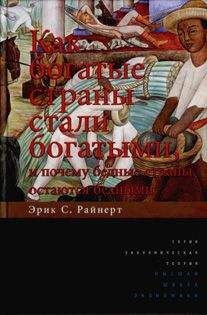Ознакомительная версия.
Hume David. The History of England from the Invasion of Julius Caesar to the Revolution in 1688, 6 volumes, A. Millar, London, 1767.
Jacobs Jane. Cities and the Wealth of Nations, Random House, New York, 1984.
Jenkins David. The Textile Industries, vol. 8 of R. A. Church and E. A. Wrigley (eds), The Industrial Revolution, Blackwell, Oxford, 1994.
Jones Richard. An Essay on the Distribution of Wealth, John Murray, London, 1831.
Justi Johann Heinrich Gottlob von. Vergleichungen der Europäischen mit den Asiatischen und ändern vermeintlich Barbarischen Regierungen, Johann Heinrich Rüdigers, Berlin, 1762.
Kaldor Nicholas. ‘Alternative Theories of Distribution in Review of Economic Studies, 1955–1956, vol. XXIII, no. 2, reprinted in Essays on Value and Distribution, Free Press, Glencoe, 111., 1960.
Kaplan Steven. Bread, Politics and Political Economy in the Reign of Louis XV, Martinus Nijhoff, The Hague, 1976.
Keynes John Maynard. The End of Laissez-faire, The Hogarth Press, London, 1926.
Keynes John Maynard. The General Theory of Employment, Interest and Money, Macmillan, London, 1935.
Keynes John Maynard. ‘National Self-Sufficiency in The Collected Writings of John Maynard Keynes, vol. XXI, Macmillan, London, 1972, p. 233–246.
Keynes John Maynard. ‘Herbert Somerton Foxweir in The Collected Writings of John Maynard Keynes, vol. X, Macmillan, London, 1972, p. 267–296.
Keynes John Neville. The Scope and Method of Political Economy, Macmillan, London, 1890.
King Charles. The British Merchant; or, Commerce Preserv’d, 3 volumes, John Darby, London, 1721.
Koyré Alexandre. From the Closed World to the Infinite Universe, Johns Hopkins University Press, Baltimore, 1957.
Kregel Jan. ‘External Financing for Development and International Financial Stability’, G-24 Discussion Paper Series, No. 32, UNCTAD, Geneva, October 2004.
Kregel Jan, Leonardo Burlamaqui. ‘Banking and Financing of Development: A Schumpeterian and Minskyan Perspective’ in Silvana de Paula and Gary Dymski (eds), Reimagining Growth, Zed, London, 2005, p. 141–167.
Krugman Paul. Rethinking International Trade, MIT Press, Cambridge, Mass., 1990.
Krugman Paul. Geography and Trade, MIT Press, Cambridge, Mass., 1991.
Krugman Paul. Development, Geography, and Economic Theory, MIT Press, Cambridge, Mass., 1995.
Krugman Paul. ‘Ricardo’s Difficult Idea. Why Intellectuals don’t Understand Comparative Advantage’ in Gary Cook (ed.), The Economics and Politics of International Trade. Freedom and Trade, vol. II, Routledge, London, 1998, p. 22–36.
Kuhn Thomas. The Structure of Scientific Revolutions, University of Chicago Press, Chicago, 1962.
Laffemas Barthélemy. Reiglement [sic] general pour dresser les manufactures en ce royaume, et couper le cours des draps de soye, & autres merchandises qui perdent & ruynent TEstat: qui est le vray moyen de remettre la France en sa splendeur, & de faire gaigner les pauvres… Claude de Monstr’oil and Jean Richter, Paris, 1597.
Landes David. The Wealth and Poverty of Nations, Norton, New York 1998.
Lane Frederick. Profits from Power. Readings in Protection-Rent and Violence-Controlling Enterprises, State University of New York Press, Albany, 1979.
Lavinas Lenay, Eduardo Henrique Garcia. Programas Sociais de Combate à Fome. O legado dos anos de estabilizaçâo económica, eda UFRJ/IPEA, Coleção Economia e Sociedade, Rio de Janeiro, 2004.
Lawson Tony. Economics & Reality, Routledge, London, 1997.
List Friedrich. Das Nationale System der Politischen Oekonomie, G. Cottascher Verlag, Stuttgart and Tübingen, 1841; English translation, The National System of Political Economy, Longman, London, 1885.
Lucas Robert E. ‘On the Mechanics of Economic Development’ in Journal of Monetary Economics, 1988, vol. 22, p. 3–42.
Lundvall Bengt-Ake (ed.). National Systems of Innovation: Towards a Theory of Innovation and Interactive Learning, Pinter, London, 1992.
McCloskey Deirdre [Donald]. The Rhetoric of Economics, The University of Wisconsin Press, Madison, 1985.
McCloskey Deirdre [Donald]. Knowledge and Persuasion in Economics, Cambridge University Press, Cambridge, 1994.
Machiavelli Niccolò. Tutte le opere storiche e letterarie, Barbèra, Florence, 1929.
Malynes Gerhard. The Maintenance of Free Trade, According to the three essentiall [sic] Parts… Commodities, Moneys and Exchange of Moneys, William Sheffard, London, 1622.
Malynes Gerhard. The Center of the Circle of Commerce, or, A Refutation of a Treatise… lately published by E.M., Nicholas Bourne, London, 1623.
Marshall Alfred. Principles of Economics, Macmillan, London, 1890.
Meek Ronald. Social Science and the Ignoble Savage, Cambridge University Press, Cambridge, 1976.
Meyen Johann Jacob. Wie kommt es, dass die Oekonomie bisher so wenig Vortheile von der Physik und Mathematik gewonnen hat; und wie kann man diese Wissenschaften zum gemeinen Nutzen in die Oekonomie einführen, und von dieser Verbindung auf Grundsätze kommen, die in die Ausübung brauchbar sind? A prize winning essay to the Royal Prussian Academy, Berlin, 1770.
Mill John Stuart. Principles of Political Economy, Longmans, Green & Company, London, 1848/1909.
Mirowski Philip. More Heat Than Light: Economics as Social Physics, Physics as Nature’s Economics, Historical Perspectives on Modern Economics, Cambridge University Press, Cambridge, 1989.
Mirowski Philip. Machine Dreams: Economics becomes a Cyborg Science, Cambridge University Press, Cambridge, 2001.
Misselden Edward. Free Trade and the Meanes [sic] to Make Trade Flourish, Simon Waterson, London, 1622.
Misselden Edward. The Circle of Commerce or the Ballance [sic] of Trade, Nicholas Bourne, London, 1623.
Mitchell Wesley Claire. ‘Sombart’s Hochkapitalismus’ in The Quarterly Journal of Economics, February 1929, vol. 43, no. 2, p. 303–323.
Mitchell Wesley Claire. Types of Economic Theory, from Mercantilism to Institutionalism, Kelley, New York, 1967.
Monroe Arthur Eli. Early Economic Thought, Selection from Economic Literature prior to Adam Smith, Harvard University Press, Cambridge, Mass., 1930.
Montesquieu Charles-Louis de Secondat. Baron de, The Spirit of the Laws, Hafner, New York, 1949.
Morgan Mary S., Malcolm Rutherford (eds). From Interwar Pluralism to Postwar Neoclassicism, Annual Supplement to History of Political Economy, vol. 30, Duke University Press, Durham, 1998.
Morgenthau Henry, Jr. Germany is Our Problem. A Plan for Germany, Harper, New York, 1945.
Murra John. La organización económica del estado inca, Siglo XXI, México, 1978.
Murra John. El Mundo Andino, población, medio ambiente y economía, Instituto de Estudios Peruanos, Lima, 2002.
Myrdal Gunnar. Development and Under-development: A Note on the Mechanisms of National and International Economic Inequality, National Bank of Egypt, Cairo, 1956.
Neill Charles Patrick. Daniel Raymond. An Early Chapter in the History of Economic Theory in the United States, Johns Hopkins Press (Johns Hopkins University Studies in Historical and Political Science), Baltimore, 1897.
Nelson Richard R. ‘Economic Development from the Perspective of Evolutionary Economic Theory’ in The Other Canon Foundation and Tallinn University of Technology Working Papers in Technology Governance and Economic Dynamics, No. 2, 2006; downloadable at http://hum.ttu.ee/tg/
Nelson Richard R. (ed.). National Innovation Systems, Oxford University Press, London, 1993.
Nelson Richard R., Sidney G. Winter. An Evolutionary Theory of Economic Change, Belknap Press of Harvard University Press, Cambridge, Mass., 1982
Nelson Robert H. Economics as Religion: From Samuelson to Chicago and Beyond, Penn State University Press, University Park, 2001.
Nietzsche Friedrich. Thus spoke Zarathustra, Penguin Books, London, 1968.
Nietzsche Friedrich. Werke, Digitale Bibliothek Band 31, Directmedia (CD-ROM), Berlin, 2000.
Nye John Vincent. ‘The Myth of Free-Trade Britain and Fortress France. Tariffs and Trade in the Nineteenth Century’ in Journal of Economic History, 51, 1, March 1991, p. 23–46.
O'Brien Patrick. ‘Historiographical Traditions and Modern Imperatives for the Restoration of Global History’ in Journal of Global History, 2006, vol. 1, issue 1, p. 3–39.
Ortiz Fernando. Cuban Counterpoint. Tobacco and Sugar, Alfred A. Knopf, New York, 1947.
Ortiz Luis. ‘Memorandum to the King to Prevent Money from Leaving the Kingdom’, Madrid, 1558; quoted in Earl J. Hamilton, ‘Spanish Mercantilism before 1700’ in Edwin Francis Gay, Facts and Factors in Economic History — Articles by Former Students, Harvard University Press, Cambridge, Mass., 1932.
Paine Robert (ed.). The White Arctic. Anthropological Essays on Tutelage and Ethnicity, Institute of Social and Economic Research, Memorial University of Newfoundland, St Johns, 1977.
Perez Carlota. Technological Revolutions and Financial Capital. The Dynamics of Bubbles and Golden Ages, Edward Elgar, Cheltenham, 2002.
Perez Carlota. ‘Technological Revolutions, Paradigm Shift and Socio-Institutional Change’ in ErikS. Reinert (ed.), Globalization, Economic Development and Inequality: An Alternative Perspective, Edward Elgar, Cheltenham, 2004.
Perez Carlota, Luc Soete. ‘Catching Up in Technology: Entry Barriers and Windows of Opportunity in G.Dosi et al. (eds), Technical Change and Economic Theory, Pinter, London, 1988, p. 458–479.
Pfeiffer Johann Friedrich von. Vermischte Verbesserungsvorschläge und freie Gedanken, vol. 2, Esslinger, Frankfurt, 1778.
Pfeiffer Johann Friedrich von. Der Antiphysiokrat, oder umständliche Untersuchung des sogenannten physiokratischen Systems für eine allgemeine Freyheit und einzige Auflage auf den reinen Ertrag der Grundstücke, Schäfer, Frankfurt am Main, 1780.
Pfeiffer Johann Friedrich von. Grundsätze der Universal-Cameral-Wissenschaft oder deren vier wichtigsten Säulen, nämlich der Staats-Regierungskunst, der Policey-Wissenschaft, der allgemeinen Staats-Oekonomie, und der Finanz-Wissenschaft, 2 volumes, Esslingersche Buchhandlung, Frankfurt, 1783.
Polanyi Karl. The Great Transformation, Rinehart 8í Co., New York, 1944.
Polanyi Karl. Conrad Arensberg and Harry Pearson, Trade and Markets in the Early Empires, Free Press, New York, 1957.
Pommeranz Kenneth. The Great Divergence: China, Europe, and the Making of the Modern World Economy, Princeton University Press, Princeton, 2000.
Porter Michael. The Competitive Advantage of Nations, Free Press, New York, 1990
[Putumayo Affair] Report by His Majesty’s Consul at Iquitos on his Tour in the Putumayo district, Presented to both Houses of Parliament by Command of His Majesty, His Majesty’s Stationery Office, London, 1913.
Quesnay François. Traité des Effets et de l’Usage de la Saignée, d’Houry, Paris, 1750.
Rae John. Statement of Some New Principles on the Subject of Political Economy, Exposing the Fallacies of the System of Free Trade, and of Some Other Doctrines Maintained in the ‘Wealth of Nations’, Hilliard, Gray & Co., Boston, 1834.
Raymond Daniel. Thoughts on Political Economy, Fielding Lucas, Baltimore, 1820.
Reder Melvin. Economics. The Culture of a Controversial Science, University of Chicago Press, Chicago, 1999.
Reinert Erik. International Trade and the Economic Mechanisms of Underdevelopment, Ph. D. thesis, Cornell University, 1980.
Reinert Erik. ‘Catching-up From Way Behind — A Third World Perspective on First World History’ in Jan Fagerberg, Bart Verspagen and Nick von Tunzelmann (eds), The Dynamics of Technology, Trade, and Growth, Edward Elgar, Aldershot, 1994, p. 168–197.
Reinert Erik. ‘Competitiveness and Its Predecessors — a 500-Year Cross-National Perspective’ in Structural Change and Economic Dynamics, 1995, vol. 6, p. 23–42.
Reinert Erik. ‘The Role of Technology in the Creation of Rich and Poor Nations: Underdevelopment in a Schumpeterian System’ in Derek H. Aldcroft and Ross Catterall (eds), Rich Nations — Poor Nations. The Long Run Perspective, Edward Elgar, Aldershot, 1996, p. 161–188.
Reinert Erik. ‘Diminishing Returns and Economic Sustainability: The Dilemma of Resource-Based Economies Under a Free Trade Regime’ in Stein Hansen, Jan Hesselberg and Helge Hveem (eds), International Trade Regulation, National Development Strategies and the Environment: Towards Sustainable Development? Centre for Development and the Environment, University of Oslo, Oslo, 1996, p. 119–150.
Reinert Erik. ‘Raw Materials in the History of Economic Policy; or, Why List (the Protectionist) and Cobden (the Free Trader) Both Agreed on Free Trade in Corn’ in Gary Cook (ed.), The Economics and Politics of International Trade. Freedom and Trade, vol. II, Routledge, London, 1998, p. 275–300.
Reinert Erik. ‘The Role of the State in Economic Growth’ in Journal of Economic Studies, 26 (4/5), 1999, p. 268–326. A shorter version can be found in Pier Angelo Toninelli (ed.), The Rise and Fall of State-Owned Enterprises in the Western World, Cambridge University Press, Cambridge, 2000, p. 73–99.
Reinert Erik. ‘Karl Bücher and the Geographical Dimensions of Techno-Economic Change’ in Jürgen Backhaus (ed.), Karl Bücher: Theory — History — Anthropology— Non-Market Economies, p. 177–222, Metropolis, Marburg, 2000.
Ознакомительная версия.





